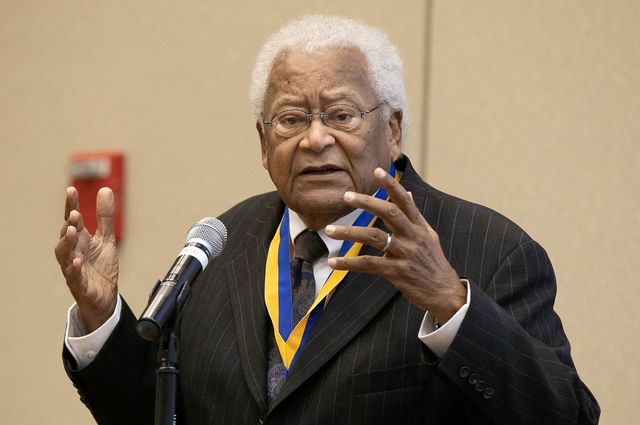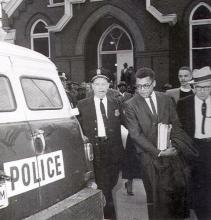
June 10, 2024
It is with a heavy heart we share with you the passing of our beloved and long-time civil rights and human rights activist Reverend James M. Lawson Jr., on June 9. As you know, Rev. Lawson dedicated nearly the last fourteen years of his life to us at CSUN’s Civil Discourse & Social Change. His contributions as a teacher, mentor, strategist, and human being have touched and transformed so many of us in the CSUN community.
The story of Rev Lawson’s life is the story of a person who has lived his life with humility and grace. During his freshman year in College, he joined the Fellowship of Reconciliation and the Congress of Racial Equality— both organizations that advocated for nonviolent resistance to racism. He committed his life courageously to nonviolence and opposed war declaring himself a conscientious objector in 1951. As a result, he served fourteen months in prison.
In the 1950s, as a young man in his mid-20s, Reverend Lawson went to India as a missionary. While there, he studied the principals of satyagraha, the philosophy and practice of nonviolence developed by Gandhi and his followers.
At the end of the 1950s, he made a commitment to the Civil Rights movement by moving to the South to work with Dr. Martin Luther King and others. As a central strategist, organizer and leader of the Civil Rights movement, Rev Lawson studied what would motivate and galvanize people to support the movement, how best to organize for mass action, and how to create effective nonviolent social change. He built the Nashville Student Movement training students. Many of these young people (e.g., John Louis, James Bevel and Diane Nash) trained by Rev Lawson became vital leaders of the Civil Rights Movement and beyond.
Rev. Lawson has committed himself to connecting the dots to see how the fight for racial justice is connected to the struggle for justice based on gender, how the fight against sexism is intertwined with prejudice and the institutional exclusion of gays, lesbians, bi and trans folks, and how the wars and prisons we fund are connected to the de-funding of education, to racism and capitalism.
His courage to take meaningful action continued for 70 years at rallies, marches, on the streets, and in churches. His actions consistently called and continue to call others to nonviolent action. He made these commitments because he believed deeply in the power of nonviolence, in the human capacity for justice and equality, and in the creative potential of the human spirit.
And he has done all of this with humility and grace.
Reverend James M. Lawson Jr’s life is a testament to the power of the human spirit committed to nonviolent struggle for justice. May he remain in our hearts and in our daily actions, behavior and treatment of one another.
Kathryn Sorrell, Marta López-Garza
Co-founders, Civil Discourse & Social Change Initiative


 Reverend James Lawson has been working with the CDSC initiative at CSUN since 2010.
Reverend James Lawson has been working with the CDSC initiative at CSUN since 2010.